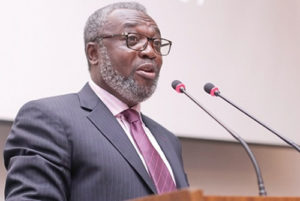Ghana now making efforts to get 15 testing centres for novel coronavirus

Dr Anthony Nsiah Asare, the Presidential Adviser on Health, Monday announced that the Government is working towards having at least 15 centres across the country to test everyone who has come into contact with a COVID-19 patient.
The centres would have a combined capacity of testing 200,000 samples. At present, tests are conducted at the Noguchi Memorial Institute for Medical Research in the Greater Accra Region and the Kumasi Centre for Collaborative Research in the Ashanti Region
Addressing a sensitisation programme on COVID-19 for senior journalists, in Accra, under the auspices of the Ghana Journalists Association, Dr Nsiah Asare said some ACR machines in some of the health facilities would be calibrated for testing the virus.
He, therefore, urged the media to encourage anyone who had come into contact with a patient to make himself or herself available for voluntary testing.
People should also not go to the quarantine facilities to pick their relatives home, he said, explaining that it was safer to keep one person suspected to be exposed to virus in isolation for the mandatory 14 days than to bring that person home to likely spread it to an entire family or beyond.
A total of about 100,000 people, he said, had been targeted for testing to be able to isolate and treat those exposed to the respiratory virus to prevent them from spreading it.
“In our efforts to contain the disease, we have to learn the experience of South Korea and Japan and one of them is to test, test, and test the people who are sick and as the President said, we are expecting 50,000 test kits in the meantime to test everybody, who has been exposed to a patient.”
“So far, we have identified more than 500 people through our contact tracing and we are still searching so that when we test anyone who is positive, we can isolate them and when they opt for self-quarantine, we will teach them what to do,” he said.
Dr Nsiah Asare said all major health facilities were being made to designate isolation facilities for COVID-19 patients, while adequate Personal Protective Equipment were being procured for all frontline workers, including health and security officers.
He appealed to every citizen to cooperate with the authorities in their efforts to limit and prevent the importation of the disease, prevent its spread in the society and provide adequate treatment for the sick to prevent a lockdown situation.
The near empty streets in Accra, following the closure of the markets for disinfection, he said, was an indication of how a lockdown situation would affect social life and grind the economy to a halt.
Should it become necessary to introduce more stringent measures, he said, it would be imperative to have the cooperation of everyone for the common good.
He debunked information that the virus could be spread through the air, saying existing scientific literature did not support that.
“I have read the literature, which says that depending on the environment, the virus may be present in aerosol for about six to eight hours, but it doesn’t say anywhere that you can get it from breathing it from the air,” he stated.
“What we know is that it is spread through the droplets of patient through contact, either by directly sneezing or coughing into another’s face and touching a surface, which has the virus. It stays longer on some surfaces than others, but luckily, this virus can be washed away by soap and water.”
He, however, explained that science was still in the process of discovering the nature and characteristics of the virus and would update the literature when necessary.
He advised that the existing health preventive protocol, including the washing of hands with soap under running water and using alcohol-based sanitizers; maintaining social distance and covering the mouth with a disposal tissue when sneezing and coughing be strictly adhered to.
A sensitisation programme was aimed at getting the participants well informed and to use the right information resources to educate the public to avoid spreading fear and panic rather than calm.
Ghana has so far recorded 27 cases with two deaths.
Source: GNA
